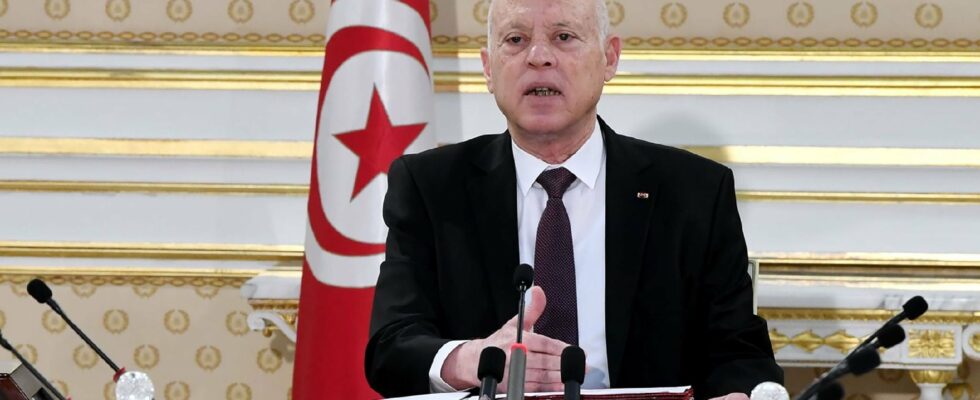In a matter of hours, she became the face of ruthless state repression in Tunisia. Sonia Dahmani, lawyer and columnist critical of the Tunisian president, was arrested on May 11 at the headquarters of the Bar Association in Tunis – where she had taken refuge -, accused of having denigrated the anti-migrant policy of Kaïs Saïed. The muscular intervention, broadcast by the France 24 channel, whose correspondent was live when the police burst into the building, made the rounds on social networks. It once again testifies to the dictatorial turn of the president, who has granted himself full powers since July 2021. “Kaïs Saïed has a deep contempt for democracy and practices dangerous identity-based authoritarianism,” believes CNRS researcher Vincent Geisser. Interview.
L’Express: Since his coup in July 2021, Kaïs Saïed has intensified the repression. How to interpret last weekend’s arrests?
Vincent Geisser : We must look at the profile of the personalities arrested. We went from “classic” repression, targeting declared opponents, to all-out arrests of people targeted for what they represent: journalists, lawyers, women, profiles open to the world, who symbolize the freedom of expression. Kaïs Saïed embodies an authoritarianism of identity, like his project: a purely Tunisian, Arab-Muslim Tunisia, a sovereignism taken to the extreme, where everything that comes from abroad, from the West in particular, is viewed with suspicion. Consequently, personalities who symbolize international openness, a society where speech is free, where humor and irony can be used, are repressable.
Zine el-Abidine Ben Ali (who presided over Tunisia from 1987 until his overthrow in 2011) was not a softy, far from it – this army general spent his entire career at the Ministry of the Interior, in the intelligence service – but his repression was mainly targeted against his opponents. This is authoritarianism with a cultural basis. It is “the Tunisia of the losers”, those who have never moved and are attached to a mythologized national identity, who take their revenge both on democracy but also on the Bourguiba years, the president from 1957 to 1987, founder of modern Tunisia, who made reforms in favor of women.
Kaïs Saïed, for his part, is very conservative in terms of values, he is an Arab ultranationalist, who speaks a caricatured literary Arabic, in a country where heads of state have always mixed Tunisian dialectal Arabic, literary Arabic and French. This man has a cultural and ideological project for Tunisia, he hates parliamentary democracy and does not hide it, considers that this political regime is not made for Tunisians.
However, he seems to retain some support among the population…
When he was elected in 2019, this law professor was known as someone rather simple and ordinary, a character close to the people, wearing reasonably priced suits, chatting with young people in cafes. But over time, we realized that he had a very personal and autocratic vision of power, coupled with a strong conservatism. When he froze Parliament and granted himself full powers in July 2021, he initially received significant support, both from people who, like him, consider that Tunisian identity must be defended, and that democracy is a concept imported from the West, and from people who see him as a man who will restore order in the midst of the economic crisis and the Covid-19 pandemic. In reality, he placed all political actors under surveillance, whatever their political, religious or philosophical allegiance; dismantled all spaces of freedom: associations, NGOs, intellectual circles. All this while hammering home an anti-elite discourse, particularly against French-speaking elites. A professional constitutionalist, Kaïs Saïed knows institutions perfectly but has deep contempt for democracy. Finally, he realizes his project.
After the police raid on May 11 at the headquarters of the Bar Association to arrest Sonia Dahmani, another raid took place on May 13 by unidentified hooded men, an increasingly common practice?
Kaïs Saïed relies more and more on the people to attack his enemies. During the Ben Ali era, repression was the job of the security apparatus, involving uniformed police officers, others in plain clothes and informers. There, we enter into a militia logic, where ordinary Tunisians attack these “enemies” designated by the conspiratorial president. We saw this with the hunt against sub-Saharan migrants. From now on, all Tunisians identified as “anti-patriots” are potential targets.
Who can stop this drift towards total dictatorship?
After the July 2021 coup, many observers thought that if Kaïs Saïed were fired as dictator, the people would rise up. It did not happen. There is a very strong resignation among the population, including among young people, a great bitterness towards the “democracy years” in the post-revolution [de décembre 2010 à fin février 2011]. Some even speak of the “dark years”. Realize, this is the term used to talk about the terrorist period in Algeria in the 1990s!
Today, a leaden pall has fallen on the country. Political and citizen activism is frozen, fear is everywhere. However, the state of the economy, at its lowest, remains Kaïs Saïed’s Achilles heel. The question of social justice, the great failure of Tunisian democracy, could weaken it in the future. The children or little brothers of those who made the revolution in 2010-2011, more pro-Kaïs Saïed, could turn against him for the same reasons as those which brought down Ben Ali.
Another hypothesis, a military putsch. The Tunisian army, supported by influential actors (notably Algeria), could come forward if Kaïs Saïed becomes a factor of disorder in its eyes. In this scenario, it would not be a coup to restore democracy.
.
